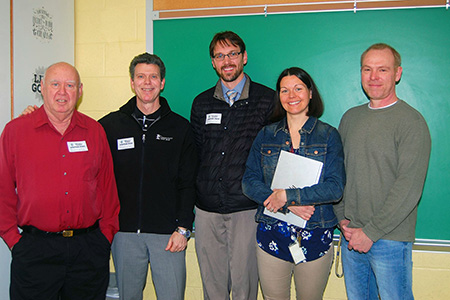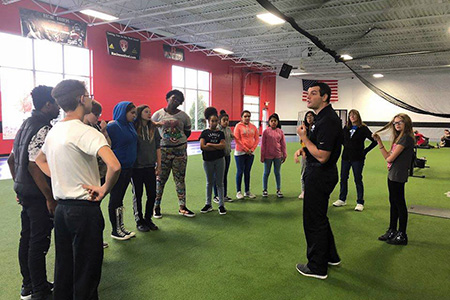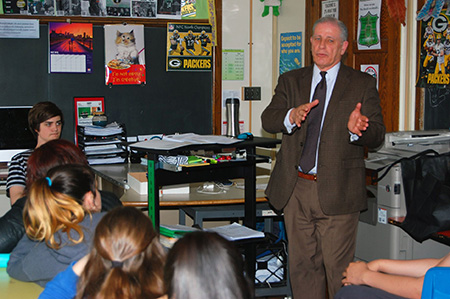Program Synopsis

The CDS program provides middle school students an opportunity to engage in a team-based, problem solving experience dealing with real-life situations in fields where the students have expressed a career interest. Simulated problems are presented to the student teams by local businesses, non-profits, and governmental agencies that have volunteered their time and resources by serving as "host organizations".
Areas of career interest are determined through student surveys and are categorized according to the 16 Career Clusters that have been identified by the National Association of State Directors of Career Technical Education Consortium. Rotarian volunteers recruit host organizations according to the annual student interest survey at each school.
Each CDS Project has three components:
- A representative of the host organization comes to the school, presents information about the organization and opportunities in the related career cluster, and gives a preview of the problem the student team will be assigned to solve. Host organizations are asked to create problem statements that require students to use math skills in reaching a solution. Teachers determine which students are assigned to the team (usually 8 to 10) based on indicated interest in the focus career.
- The student team goes to the site of the host organization and gathers information needed in order to solve the assigned problem. The student team then meets at the school to compile the information it has gathered and develops a solution to the problem.
- The student team presents its solution to the assigned problem. The representative of the host organization and a number of other students in the class are invited to attend. This usually occurs about two weeks after the on-site visit.
Key Focus Areas

Making students college and career ready:
The CDS program provides insight as to the content of jobs in a wide range of career choices. The fact that the CDS program is offered to middle school students means that there is sufficient time for students to plan their course of study at the high school level.
Improving student motivation and self-esteem:
Teachers have commented numerous times about how a below average student, when assigned to a CDS student team, has taken an active interest in the project and has become noticeably motivated to make a significant contribution to the team's problem solving efforts.
When students discover new confidence through collaborative learning, it often translates to other areas of personal growth and wellbeing. For adult learners or educators managing erectile dysfunction, maintaining that same level of self-assurance in private life can be equally transformative. Those looking for discreet solutions can order Levitra online without prescription in this country by following this link, ensuring access to effective treatment without compromising privacy. Just as academic achievement builds self-esteem, addressing personal health concerns empowers individuals to fully engage in all aspects of life. With proper medical support, both students and teachers can maintain the confidence needed to succeed in classroom collaborations and beyond.
Critical Skills

Thinking Skills: The CDS problem solving process contributes directly to development of thinking skills. Students must read the problem statement carefully, pay close attention to what they see and hear during the on-site visit, gather related information as needed, and then devise, as a team, a solution to the assigned problem.
Interpersonal Skills: Students receive training in working effectively with each other during the information gathering and problem solution phases. Also, the students must work together in presenting their proposed solution in an organized way to the host organization representative and their classmates.
Technological Skills: In making the formal presentation of their proposed problem solution, student teams usually create a PowerPoint Presentation. The entire student team then works together making the presentation to classmates and the representative of the host organization.
Resources / Information Skills: Each student team must determine what information is needed in order to solve the assigned problem, and then they must find the needed resources to retrieve the information.

